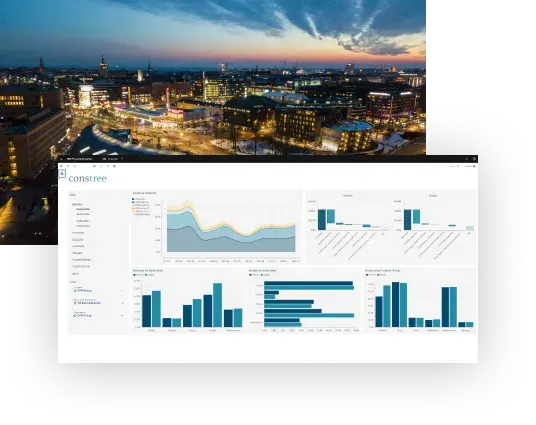In today’s fast-moving business world, disconnected planning leads to inefficiencies and missed opportunities. Integrated Business Planning (IBP) eliminates these silos by aligning sales, supply chain, finance, and HR, driving strategic outcomes. This approach enhances business planning, optimizes forecasting, and manages risks through a holistic, real-time view of the entire organization.
What Is Integrated Business Planning?
Integrated Business Planning (IBP) is a strategic process that unifies planning across all departments to align with your company's long-term goals. By breaking down silos and integrating key business functions like sales, finance, and supply chain, IBP enables data-driven decisions with real-time insights, improving operational efficiency and driving sustainable growth.
Why IBP?
Key Benefits of Integrated Business Planning
Improved business visibility
IBP provides an all-encompassing view of your business, ensuring better decision-making based on real-time, integrated data.
Operational efficiency
Integrated planning across departments reduces inefficiencies and fosters collaboration, minimizing suboptimization.
Faster strategic execution through IBP
Simulate and test strategic decisions in multiple scenarios, enabling faster, more accurate execution.

IBP technology platform: a future-proof investment
An IBP platform is more than just a tool—it offers a comprehensive data solution. With AI and predictive analytics, platforms like IBM Planning Analytics provide flexible views of your planning models, enhancing collaboration and shifting businesses from reactive to proactive decision-making. Investing in an IBP platform ensures your business is future-proof, scalable, and ready for market shifts.
IBP implementation

How to Implement Integrated Business Planning
Implementing Integrated Business Planning (IBP) requires careful planning, and in many cases, expert guidance is needed to ensure success. An experienced partner can help streamline the process, aligning departments and maximizing the platform’s potential for real-time insights and predictive analytics.
- Assess current processes to identify gaps.
- Select a platform suited to your business needs.
- Integrate key departments such as finance and operations.
- Provide necessary training for smooth adoption.
- Continuously monitor and optimize for long-term success.

Our expertise in Integrated Business Planning
At Intito, we specialize in guiding organizations through the transformation to Integrated Business Planning. We tailor IBP solutions to meet your unique business needs, aligning sales, supply chain, and HR with your strategic goals. By optimizing processes, we help businesses drive more informed decision-making and better collaboration across departments.
Integrated Business Planning customer stories
Barona builds efficient ESG reporting foundation with Intito ESG Solution
Fibox unifies reporting and planning with IBM Controller and Planning Analytics
Building the Vianor Price Engine with Intito
Nova Consulting Group builds a scalable reporting foundation with IBM Controller and Intito
TGS streamlines consolidation with seamless IBM Controller cloud migration
Mustad Eiendom transforms consolidation and reporting with IBM Controller Cloud
Business Finland got rid of Excel-based budgeting and forecasting and saves time
Raisio renewed its group accounting and consolidation solution
Pohjolan Voima benefits from use of IBM Planning Analytics
Modernizing financial reporting for Veikko Laine Oy
NoHo updated its reporting process – automation to streamline the workflow
The City of Oulu has an innovative approach to operational and financial planning
HMD global implemented a new consolidation platform in 3 months
Statistics Finland's modern budgeting solution
Siun sote’s modern financial planning software
Destia’s project business forecasting elevated to a new level
KWH Group needed a consolidation platform for ambitious environments
Gasum took the first step towards integrated business planning
Tornator jumps to the next level in financial planning
Veho streamlined their planning and gained better visibility into the future
Caverion recognized ESEF as a possibility for automated reporting
Atria capitalizes on mandatory ESEF reporting
Bravedo transforms to fully integrated planning solution
Vaasan achieved better transparency in its business operations
FAQ
What is Integrated Business Planning (IBP)?
IBP is a strategic planning process that unites various business functions, such as finance, sales, and supply chain, to drive better alignment and decision-making.
How does IBP differ from traditional planning?
Traditional planning is often siloed, while IBP integrates all departments for a holistic view, improving visibility, collaboration, and decision-making.
What are the key benefits of IBP?
Key benefits include improved business visibility, optimized supply chain management, and enhanced collaboration across cross-functional teams.
How does IBP improve financial performance?
By aligning all business units and using predictive analytics, IBP helps businesses optimize resources, improve inventory management, and make informed financial decisions.
Is IBP suited for long-term strategic planning?
Yes, IBP supports long-term planning by aligning operational decisions with strategic business goals, ensuring adaptability to market trends.
What technology is used for IBP?
IBP typically leverages advanced platforms like IBM Planning Analytics to unify business functions and integrate data across departments.
How does IBP help manage supply chain operations?
IBP integrates supply chain planning with other departments, providing real-time insights into inventory levels, demand forecasts, and supplier performance, ensuring alignment with overall business goals.
Can IBP be implemented in any industry?
Yes, IBP is adaptable across various industries, including manufacturing, retail, finance, and healthcare, where cross-functional alignment is essential.
How quickly can a business see results from IBP?
Businesses typically begin seeing benefits such as improved decision-making, better collaboration, and optimized resources within a few months of implementing IBP.
What role does predictive analytics play in IBP?
Predictive analytics in IBP allows companies to forecast future outcomes, such as demand and resource needs, enabling better proactive planning and minimizing risks.
